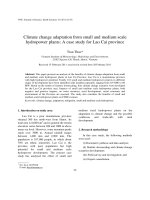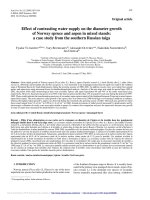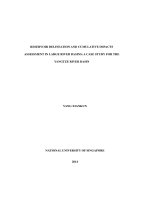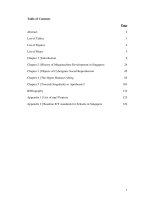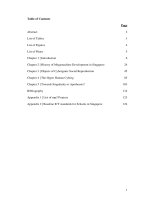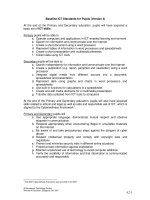Consumer society and the technology of education a case study of the singapore education system 1
Bạn đang xem bản rút gọn của tài liệu. Xem và tải ngay bản đầy đủ của tài liệu tại đây (1.63 MB, 4 trang )
Search:
• The ICT Connection
Directory · Login
All
H ome . Forum . H appenings . A bout I P Rs . U s er G uides . Feedbac k
Printable
mp3 Projects
ICT IN ACTION>>
Lesson Examples
Lesson Ideas
Technology Scan
You Can Do IT!
The ICT Connection > ICT in Action > mp3 Projects
The mp3 projects aim to strengthen our pedagogical understanding of ICT use by translating research and innovations
into conditions and methods to be applied in the classrooms, which can be adopted by other teachers and schools.
These projects are (in alphabetical order):
mp3 Projects
Events
10'C,10'M,10'T
BackPack LIVE!
Baseline ICT Standards
Cyber Wellness Framework
Cyber Wellness Research
Cyber Wellness Resources
CWSAP
10'C, 10'M, 10'T
10’C is an ICT-based Chinese Language learning and teaching
programme based on a pedagogical model developed by Beijing Normal
University, PRC. It aims to promote students’ interest and improve their
competencies in the language through regular self-paced learning
activities in an enriching web-based interactive environment. ETD has
been collaborating with schools on the programme since 2008. The
programme was adapted for the learning and teaching of the Malay (10’M
Aksara) and Tamil (10’T Sigaram) languages in 2010.
BackPack LIVE! Education Initiative with the Infocomm Development Authority of Singapore (IDA) and Microsoft
Singapore
Singapore, 16 July 2009–Ministry of Education (MOE), the Infocomm
Development Authority of Singapore (IDA) and Microsoft Singapore, today
announced the launch of the BackPackLive! initiative. This initiative is an
expansion of the previous five year IDA-Microsoft BackPack.NET initiative
launched in2003. The new collaboration will focus on inspiring, exploring
and scaling ICT practices among teachers to develop students’ selfdirected and collaborative learning capability.
Visit their website for details on:
eduLab
English Language Oracy Portal
FutureSchools@Singapore
ICT Mentor Programme
iMTL Portal
Interactive Heritage Trails
Propel-T
R&D Programme on IDM
Schools Digital Media Awards
SEED-ICT
Virtual Worlds
we-Learn Portal
Like
Be the first of your friends to like this.
Microsoft-MOE Professional Development Award (MMPDA)
Baseline ICT Standards
The Baseline ICT Standards define the basic level of knowledge, skills and
values that Singapore pupils need in order to fully benefit from a curriculum
enriched with ICT, and eventually thrive in a technology-driven society. The
online "Baseline ICT Standards – Guide to Implementation" aims to support
schools, Heads of Department and teachers in integrating the Baseline ICT
Standards into the curriculum. It offers tips, suggested strategies and
resources to support the planning, implementation, monitoring and
reviewing of processes in schools. Schools have the flexibility to adopt and
adapt the suggestions in this guide to meet their needs. More information
can be found on />
Cyber Wellness Framework
The Cyber Wellness Framework serves as a guide for schools to plan and
implement their cyber wellness programmes. It is anchored on the two key
principles of ‘Respect for Self & Others’ and ‘Safe & Responsible Use’ to
guide students in their actions through a 3-step process of “Sense, Think
and Act”. Teachers adopt this process to help students to “be aware’ of the
potential online dangers, “think” about such dangers and make the
decision to “act’ appropriately, so as to protect themselves and others from
online dangers. The framework also comprises a set of cyber wellness
topics and associated learning outcomes for students. More information
can be found on />
Cyber Wellness Research
MOE has commissioned cyber wellness research to better understand
students’ usage patterns in mobile and Internet technologies, the issues
they encounter when using these technologies and to identify strategies to
h l t d t t
h
d
t
ith th
i
A1-1
help students, teachers and parents cope with these issues.
Cyber Wellness Resources
MOE supports schools by providing educational resources for teachers
and students. The resources include starter kits providing lesson ideas for
teachers to teach various cyber wellness topics as well as comic books for
students illustrating the positive use of the Internet. In addition, an online
portal is available within edumall2.0 ( to
serve as a one-stop resource centre for teachers and students. Tips for
parents to prepare their children for the digital world are also available on
the portal. MOE collaborates with other ministries and agencies, especially
through Inter-Ministry Cyber Wellness Steering Committee, to support
school programmes with resources that are customised to the needs of
various students groups.
Cyber Wellness Student Ambassador Programme
The Cyber Wellness Student Ambassador Programme (CWSAP) was
introduced to schools in November 2009 to provide schools with an
extended platform to complement and support their existing cyber wellness
programmes. The CWSAP aims to leverage positive peer influence to
promote cyber wellness through student-led activities that engage the
student community. An annual conference is organised to equip student
leaders with knowledge and leadership skills as well as encourage
previous and incoming batches of student ambassadors to share and
learn good practice in promoting cyber wellness among their peers.
eduLab
eduLab is a mechanism which will provide a “living lab” to draw ideas with
system-wide potential from the ground and develop these concepts into
ICT-infused lessons and product prototypes, through the provision of
centrally-coordinated expertise and support. To be launched in 2010,
eduLab will focus on specific themes that reflect Singapore education’s
strengths, considering ideas apart from those by teachers (e.g. students,
industry), and strengthening the central pool of expertise with thought
leadership from international and local non-MOE experts including IHL
researchers and industry. eduLab will help to drive the development of
upstream ideas and productisation of next-generational products.
More information can be found in
/>c=/iresearch/pagetree&func=view&rid=161
the
eduLab
page
at
English Language Oracy Portal (ELOP)
The EL Oracy Portal is currently in its developmental stage. The pilot will
begin in June 2011 in Yu Neng Primary School and Yusof Ishak Secondary
School. The project leverages interactive digital media (IDM) to create
highly stimulating learning experiences to motivate students to learn and
communicate in the English Language. An Interactive StoryBook and a
Virtual World Role-playing Game are being developed.
FutureSchools@Singapore
FutureSchools@Singapore aims to equip our pupils holistically with the
essential skills to be effective workers and citizens in the globalised and
digital workplace of the future. Each FutureSchool will also experiment, on
a school-wide scale, with various innovative ICT/IDM-enabled pedagogical
approaches for supporting high levels of engaged learning and provide
possible models for seamless and extensive integration of ICT. More
information can be found on iResearch
ICT Mentor Programme
The ICT Mentor Programme is organised by ETD to support schools in
achieving the target for effective use of ICT for learning and teaching.
Conducted in 5 Phases from 2010 to 2012, the programme aims to
provide ICT Mentors with knowledge and skills on the technical
affordances of ICT tools and the pedagogical principles related to the
appropriate use of ICT tools for learning and teaching. In addition, ICT
Mentors will acquire skills for face-to-face and online mentoring and
coaching to effectively propagate good ICT practices to colleagues in
schools. Each school will have up to four trained ICT Mentors, and they will
play the following key roles:
1. Serve as mentor to teachers on ICT use for learning and
A1-2
1. Serve as mentor to teachers on ICT use for learning and
teaching, in particular, to deliver ICT-enriched learning
experiences for students, in their respective disciplines;
2. Provide requisite knowledge on planning and delivering ICTenriched learning experiences and champion best practices by
developing lesson exemplars to showcase ICT use;
3. Facilitate the sharing of ICT resources created by teachers to
propagate good ideas and practices.
iMTL Portal
iMTL Portal is a web-based interactive portal designed to enhance
students’ learning of interactive communication in MTLs through
meaningful formative assessment.
The Portal allows students to build language foundation through
systematic learning of vocabulary and sentence structures. The Portal
also provides authentic learning for oral presentation as well as interactive
communication. Through task-based activities, iMTL Portal facilitates selfdirected and collaborative learning through the effective use of ICT.
There is provision for the usage of open tools for teachers to further
design suitable learning resources or customize the questions sited in the
central repository.
iMTL Portal will have enhanced accessibility, supplying rich media contents
for teachers to facilitate learning within and beyond the classroom.
Interactive Heritage Trails
The 7 Interactive Heritage Trails (iHTs) are currently in the development
stage. In line with the objectives of C2015 to develop confident, selfdirected, concerned and active contributors to society and the 3rd ICT
Masterplan’s vision of “harnessing ICT effectively to develop self-directed
learners with collaborative learning skills”, the iHTs will enable Humanities
students (History, Geography and Social Studies) to make explicit
connections between their classroom experiences and immediate
environment by tapping the affordability accorded by mobile technologies.
Using the pedagogical approach of inquiry, students will be provided with
the opportunities to construct their own knowledge and understanding in
location-specific areas where content relevant to current and future
curriculum will be embedded in the learning experience.
The 7 iHTs are currently in the development stage.
Propel-T
Propel-T(Prototyping Pedagogies for Learning with Technology) brings
together schools, IHLs, industry and MOE to undertake “theory-to-practice”
translational projects. These Propel-T projects seek to explore, articulate
and prototype usable pedagogical principles and implementation strategies
for self-directed learning and collaborative learning.
Images of Wordles are licensed
. MOE
image credit: />
R&D Programme on Interactive Digital M edia (IDM) in Education
MOE has initiated an R&D programme on IDM in education that supports
research projects in the following strategic areas:
o Learning of the Future, Educational Games and Socially Immersive
Virtual Environments
o Digital Literacies and Modalities of Representation:
o Social and Psychological Impact of IDM Use Among Students:
More information can be found on iResearch .
Schools Digital Media Awards
The Schools Digital Media Awards (SDMA) is a yearly competition that
provides a platform to nurture young talents in the area of creative digital
media, and to encourage user-created teaching and learning resources.
Students and teachers are encouraged to express themselves creatively
through different media - video, animation and audio – based on different
themes each year. Besides promoting teamwork and collaboration, it also
aims to enhance the development of media literacy among students and
teachers. Media-in-Education workshops are also organized to expose
teachers and students to media production tools and techniques. For
details about the competition, please log on to .
SEED-ICT
The SEED-ICT framework guides our teachers in developing a technology
A1-3
supported curriculum in an age-appropriate environment that nurtures
confident and curious pupils with strong literacy and numeracy skills.
Information and Communication Technology (ICT) offers additional ways to
learn and demonstrate learning.
It allows teachers and pupils to:
• manipulate images and data;
• visualise concepts;
• interact with on-screen materials and receive instant feedback.
Virtual Worlds
ETD is collaborating with schools and Learning Sciences Lab (LSL) of the
National Institute of Education to explore educational possibilities of
participatory immersive environments and their accompanying
pedagogical strategies. Virtual islands for selected subjects will be built,
and through pilot studies and collaboration with school teachers and
researchers, a set of pedagogical principles on the use of virtual
environments in education will be identified and disseminated.
we-Learn Portal
The we-Learn portal is designed to enable teachers in the Normal
(Technical) course to create e-assignments for teaching and learning
purposes, as well as school-based e-assessments that are aligned with EL
Syllabus 2010. In 2011, 43 secondary schools have subscribed to the weLearn portal. The portal will be rolled out to more schools in 2012. CPDD
provides comprehensive teacher training as well as briefing of school
support personnel to cultivate effective use of the portal.
Home
ICT Masterplan Journey
Masterplan 3
Learning Teams
ICT in A ction
A bout U s
M as terplan 1
V is ion and G oals
D ialogue on mp3
L es s on E xamples
C ontac t U s
M as terplan 2
U nders tanding the G oals
E duc ator L earning and
T eac hing Forum
L es s on I deas
H appenings
O ur I C T in E duc ation J ourney
I mplementation Strategies
T ec hnology Sc an
Res ourc es for Sc hools
Y ou C an D o I T !
A bout I P Rs
T erms of U s e
mp3 P rojec ts
mp3 E vents
Copy right © 2010-2011 Educational Technology Div ision, Ministry of Education, Singapore. All rights reserv ed.
For technical assistance, please contact y our respectiv e ITSS Helpdesk . Mon-Fri 7am-7pm, Sat 7am-2pm (excl. public holiday s)
A1-4
